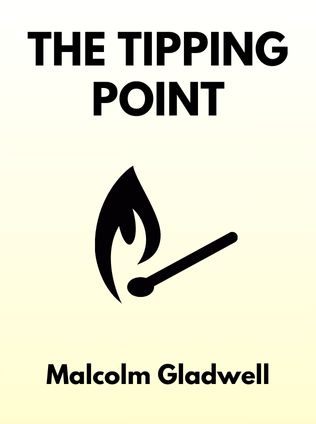
The Tipping Point
How Little Things Can Make a Big Difference
By Malcolm Gladwell
Published 01/2006
About the Author
Malcolm Gladwell is the author of five New York Times bestsellers: The Tipping Point, Blink, Outliers, What the Dog Saw, and David and Goliath. He is also the co-founder of Pushkin Industries, an audio content company that produces the podcasts Revisionist History and Broken Record. Gladwell has been included in the Time 100 Most Influential People list and has been recognized as one of Foreign Policy’s Top Global Thinkers.
Main Idea
The Tipping Point: How Little Things Can Make a Big Difference explores how small actions at the right time, in the right context, and with the right people can create a tipping point for significant change. Gladwell identifies three key factors that contribute to tipping points: the Law of the Few, the Stickiness Factor, and the Power of Context.
Table of Contents
- Introduction
- The Three Rules of Epidemics
- The Law of the Few
- The Stickiness Factor
- The Power of Context
The Three Rules of Epidemics
Gladwell explains that to understand why some ideas or products tip into widespread popularity while others do not, we need to understand the three rules of epidemics: the Law of the Few, the Stickiness Factor, and the Power of Context. These principles help us grasp how small actions and changes can have large, significant impacts.
"Ideas and products, messages, and behaviors spread just like viruses do." - Malcolm Gladwell
The three rules of epidemics provide a framework for understanding tipping points. Gladwell argues that by examining these elements, we can intentionally create tipping points in various spheres such as education, business, and policymaking.
The Law of the Few
According to the Law of the Few, a small number of people with unique social gifts can make a significant impact on spreading an idea or trend. Gladwell highlights three types of influential people: Connectors, Mavens, and Salesmen. Connectors know a large number of people across various social circles. Mavens are knowledgeable and enjoy sharing their insights. Salesmen possess the charisma and persuasive skills needed to convince others.
"The success of any kind of social epidemic is heavily dependent on the involvement of people with a particular and rare set of social gifts." - Malcolm Gladwell
the Law of the Few include:
- Paul Revere’s midnight ride, which successfully alerted colonial militia due to Revere's extensive social connections.
- The spread of fashion trends through influential personalities wearing certain styles.
Gladwell delves deeper into the roles of Connectors, Mavens, and Salesmen, explaining how each contributes to creating a tipping point. Connectors bring people together across different social networks, Mavens gather and share critical information, and Salesmen use their persuasive skills to influence others. Each plays a crucial part in creating tipping points by leveraging their unique social strengths.
"Connectors, Mavens, and Salesmen play pivotal roles in the tipping of ideas and social trends." - Malcolm Gladwell
For example, Connectors like Paul Revere had extensive social ties that helped him spread critical information quickly. Mavens are deeply knowledgeable about particular subjects and share their insights to educate others. Salesmen have the charisma and persuasive skills to convince people to adopt new ideas or products.
The Stickiness Factor
The Stickiness Factor refers to the quality that compels people to pay attention to a message and remember it. Gladwell argues that making a message "sticky" involves presenting it in a way that resonates and stays with the audience. This can be achieved through relatively simple changes in presentation and structuring.
"Stickiness means that a message makes an impact. You can't get it out of your head. It sticks in your memory." - Malcolm Gladwell
the Stickiness Factor include:
Sign up for FREE and get access to 1,400+ books summaries.
You May Also Like
The Subtle Art of Not Giving a F*ck
A Counterintuitive Approach to Living a Good Life
By Mark MansonHow To Win Friends and Influence People
The All-Time Classic Manual Of People Skills
By Dale CarnegieFreakonomics
A Rogue Economist Explores the Hidden Side of Everything
By Steven D. Levitt and Stephen J. DubnerQuiet: The Power of Introverts
The Power of Introverts in a World That Can't Stop Talking
By Susan CainIf You Tell
A True Story of Murder, Family Secrets, and the Unbreakable Bond of Sisterhood
By Gregg Olsen



















